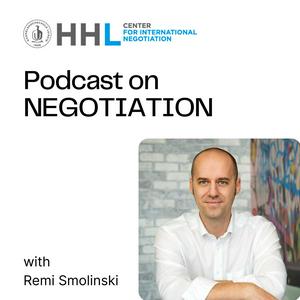On trust in intercultural negotiation with Mariusz Sikorski
In this episode, we disucss one of the most essential and most elusive elements of successful negotiation: trust. What exactly is trust, and why does it matter so much at the negotiating table? Our guest, Mariusz Sikorski, who is a practitioner and researcher specializing in intercultural negotiation, walks us through the foundations of trust, unpacking its definition and exploring the many ways it influences negotiation outcomes, often before a single word is spoken.Our conversation is rooted in a comprehensive literature review on this topic: Sikorski, M. T. & Albrecht, A., (2025) “Trust in the Context of Intercultural Negotiations - A Systematic Review”, Negotiation and Conflict Management Research 18(1), 1-41. doi: https://doi.org/10.34891/a0mc-jx98 published at the Negotiation and Conflict Management Research journal (NCMR). We explore the process behind this selection and the patterns that emerged across decades of research. From there, we discuss the challenges and opportunities of trust-building in intercultural negotiations, where assumptions, values, and expectations often collide.Is it true that we naturally trust people who are more like us? And if so, what happens when the person sitting across from us has a completely different background, worldview, or communication style? We examine how cultural similarity and difference affect our ability to connect, and how negotiators can bridge that gap intentionally. Our guest shares strategies for building trust both with culturally similar and dissimilar counterparts, going beyond surface-level rapport to deeper forms of relational trust.A key theme in the episode is cultural adaptability: how negotiators can read the room, interpret cues, and flex their own behavior to create more trusting environments. We also uncover some of the surprising and even contradictory findings from the literature, instances where conventional wisdom about trust doesn't hold up, or where cultural context changes the rules entirely.Beyond theory, this episode is packed with practical advice for negotiators and companies operating across borders. Whether you're closing a deal, managing a partnership, or leading a multicultural team, the insights shared here will help you build trust more consciously and effectively. We also reflect on the gaps in the literature, what we still don’t know about trust in negotiation—and where future research could go next.Whether you're a seasoned dealmaker or just starting to negotiate across cultures, this episode offers a thoughtful, research-backed, and actionable perspective on one of negotiation’s most human dimensions.


